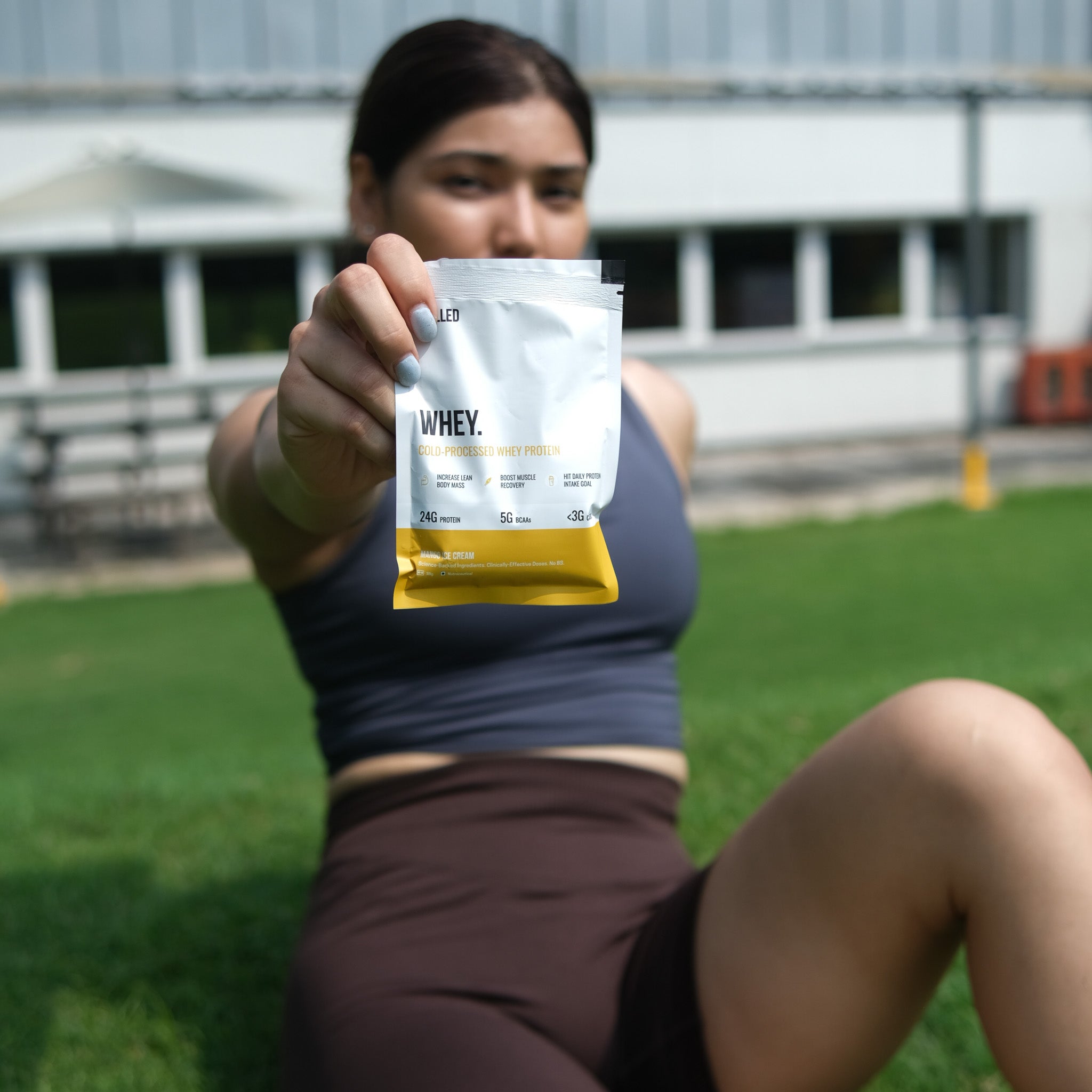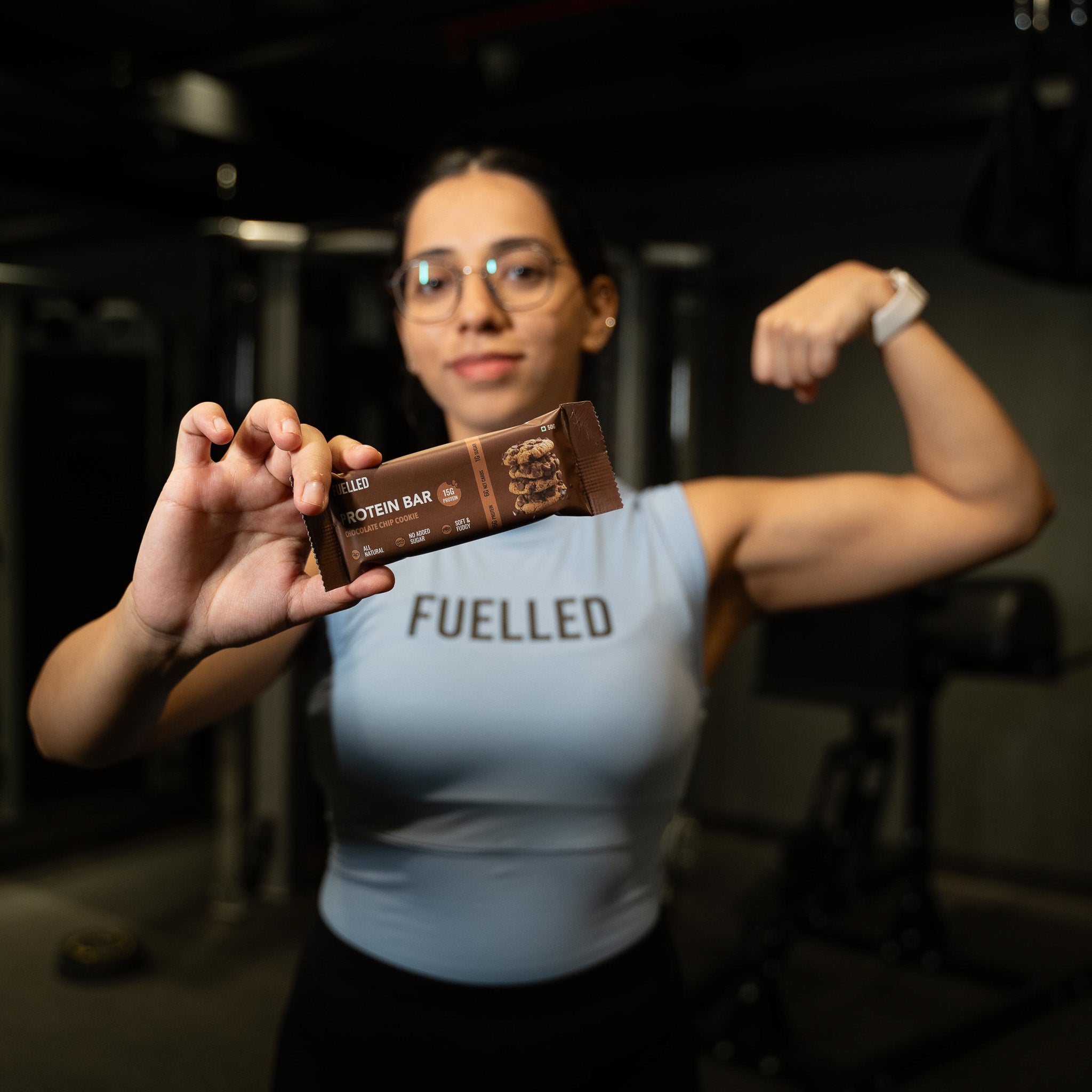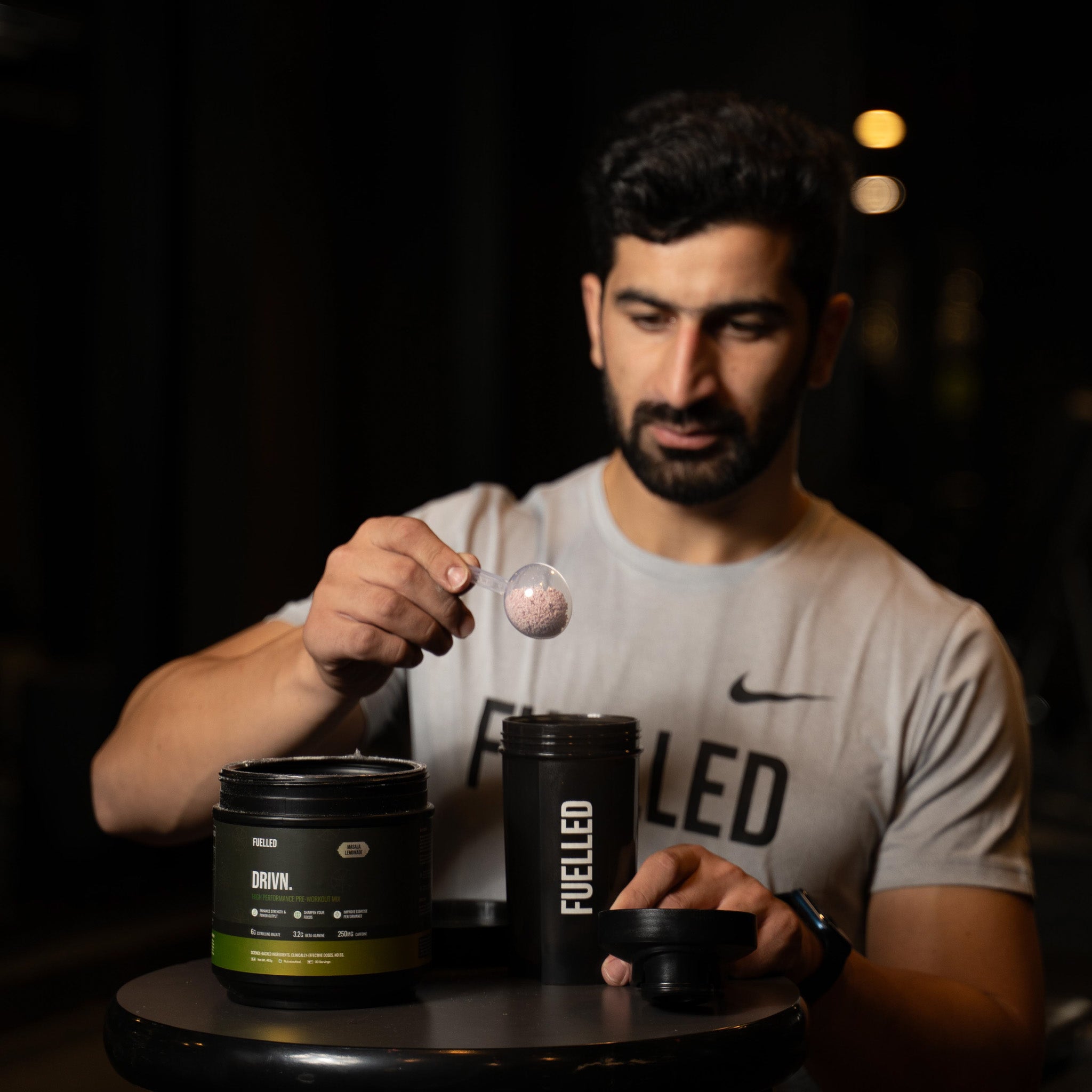Protein Bars
Protein Bars
In the fast-paced world of fitness, where convenience meets nutritional excellence, protein bars have emerged as a go-to solution for individuals seeking a quick, tasty, and protein-packed snack. Let's explore how they can be a game-changer in your quest for a fitter, healthier lifestyle.
Understanding the Basics: What Are Protein Bars?
Protein bars are compact, portable snacks designed to provide a convenient source of protein. They come in various flavours and formulations, making them an easy and efficient way to supplement protein intake, especially for those on the go.
Fuelled Protein Bars are the best convenience snack out there. It's way better than any of the not-so-healthy snacks in India like Samosa, Pakora, Sandwich, etc. and it also beats popular Indian Protein Bars with its unmatched macros. They taste more like desserts but have an unmatched nutrition profile.
Fuelled Protein Bars have 15g Protein, 5g Net Carbs, 190 Calories, and less than 2g Sugar. Its macros are unmatched - the high Protein and low Sugar and Calories combo puts it miles ahead of the competition which are loaded Carbs, Calories and Sugars. Coupled with this unmatched macro profile, Fuelled Protein Bars also taste delicious and have amazing flavours that make it taste like a dessert rather than a Protein Bar.
The Fitness Boost: How Protein Bars Aid in Your Journey
Here’s how Protein Bars help you in your fitness journey:
- Convenient Protein Source:
In our busy lives, meeting daily protein requirements can be challenging. Protein Bars offer a quick and hassle-free way to increase protein intake, bridging nutritional gaps effortlessly.
- Avoid Bingeing on Junk:
A lot of time people binge on junk food because they don’t have healthier options. Having a Protein Bar with you helps avoid this as you can munch on a bar and ignore all the Calorie heavy snacks
- Reduce Sugar and Dessert Cravings:
Fuelled Protein Bars have less than 2g Sugar yet they satisfy your Sugar and Dessert cravings as all our flavours are inspired from indulgent desserts so they taste exactly like Chocolate Chip Cookies, Peanut Butter, Brownies, etc.
- Weight Management Support:
Protein has a satiating effect, helping control appetite and reduce overall calorie intake. Protein bars, when used as a snack can help avoid junk and increase your protein intake which can be instrumental in your fat loss journey and achieving fitness goals.
- Muscle Repair and Growth:
Protein is the building block of muscles, and incorporating protein bars into your diet ensures a sustained amino acid supply, supporting muscle repair and growth.
Choosing the Right Protein Bar: What to Look For
- High-Quality Protein Sources: Opt for bars with protein derived from sources like whey, milk, or soy protein for a complete amino acid profile.
- Low Sugar Content: While some sugar is inevitable, choose bars with minimal added sugars to avoid unnecessary empty calories.
- Balanced Macronutrient Profile: Look for a good balance of protein, carbohydrates, and healthy fats to meet your energy needs and maintain overall nutritional balance.
- Ingredient Transparency: Select bars with straightforward ingredient lists, avoiding excessive additives or artificial ingredients.
Incorporating Protein Bars into Your Routine: Tips and Tricks
- Snack Smart: Enjoy a protein bar between meals or as a post-workout snack to stave off hunger and promote muscle recovery.
- Meal Replacement: On busy days, a protein bar can serve as a convenient and nutritious meal replacement, ensuring you meet your protein requirements.
- Travel Buddy: Pack protein bars when on the go or travelling to have a reliable and easily accessible source of nutrition.
- Flavourful Variety: With an array of flavours available, explore different options to keep your protein intake exciting and enjoyable.
Top 5 Misconceptions About Protein Bars
Let’s clear out all the negative perceptions on Protein Bars that may be stopping you from giving them a shot.
- Protein Bars are Only for Bodybuilders
Protein bars are not exclusive to bodybuilders. They are a convenient source of protein for anyone aiming to meet their daily protein requirements. Whether you're an athlete, a busy professional, or someone on a weight management journey, protein bars offer a quick and easy way to supplement your protein intake.
- All Protein Bars are Basically Candy Bars in Disguise
While some protein bars can contain excess sugar, Fuelled Protein Bars have less than 2g sugar. Reading labels is crucial. Opt for bars with minimal added sugars and ingredients you can recognize, ensuring you get the nutritional benefits without unnecessary empty calories.
- Protein Bars Cause Kidney Damage
There is no scientific evidence linking moderate protein intake, including that from protein bars, to kidney damage in individuals with healthy kidneys. For most people, protein bars, when consumed as part of a balanced diet, are a safe and effective way to increase protein intake without adverse effects on kidney health.
- Protein Bars Make You Gain Weight
Like any food, the impact of protein bars on weight depends on overall calorie intake and expenditure. While protein bars can be calorically dense, they can also be part of a balanced diet when consumed mindfully. Using protein bars as a convenient and portion-controlled snack can support weight management goals, especially when they replace less nutritious options. Fuelled Protein Bars have just 190 Calories so they are much better than other bars and don’t lead to as much weight gain.
- You Don't Need Protein Bars if You Eat a Balanced Diet
While it's ideal to get nutrients from whole foods, protein bars serve as a convenient snack, especially when time or circumstances make it challenging to prepare or access a balanced meal. They're not a replacement for whole foods but can be a valuable addition, ensuring you meet your protein needs, particularly on busy days or during intense workout periods.
Vegan Protein
In a world where plant-based living is increasingly celebrated, the spotlight on vegan protein has never shone brighter. Whether you're a seasoned vegan, someone considering a plant-based journey, or simply looking to diversify your protein sources, this comprehensive guide is your roadmap to understanding, selecting, and optimising vegan protein for a healthier, more sustainable lifestyle.
Understanding Vegan Protein
Vegan protein is a rich tapestry woven from various plant sources, offering a diverse array of options for those choosing a diet free from animal products. It is derived from natural plant sources such as beans, lentils, nuts, seeds, and soy. Rich in essential nutrients, it serves as a reliable option for muscle repair, immune support, and overall health.
Choosing vegan protein is not just a nutritious decision; it's also a delicious way to align with a compassionate, eco-friendly lifestyle. It is the perfect choice for vegans who want to avoid animal products, vegetarians who don’t mind trying non-whey protein derivatives, folks with digestive issues like lactose intolerance who cannot digest milk and products created from it.
Types of Protein For Vegans
Lentils: The Versatile Powerhouse
Lentils, those tiny legumes, pack a mighty punch in the protein department. Not only are they rich in protein, but they also offer a substantial dose of fibre and essential minerals. From red and green to black lentils, each variety brings its unique texture and flavour to the table. Whether in stews, salads, or soups, lentils are a versatile and affordable protein source.
Chickpeas: The Crowd Favourite
Chickpeas, or garbanzo beans, have soared in popularity, thanks to their delicious taste and adaptability. Hummus, chickpea curry, or roasted chickpeas – the options are endless. Packed with protein, fibre, and a range of vitamins and minerals, chickpeas not only nourish the body but also add a delightful creaminess to various dishes.
Quinoa: The Complete Protein
Quinoa is often hailed as a superstar among plant-based proteins. Unlike many other grains, quinoa is a complete protein, meaning it contains all nine essential amino acids. This makes it an ideal protein source for those following a vegan or vegetarian diet. Additionally, quinoa is gluten-free and rich in fibre, making it a nutritious choice for a variety of dishes.
Tofu: The Soy Sensation
Derived from soybeans, tofu has been a staple in Asian cuisine for centuries. This soy-based protein is incredibly versatile, taking on the flavours of the dishes it's cooked with. Tofu is not only an excellent source of protein but also a good provider of iron and calcium. From stir-fries to smoothies, tofu's adaptability makes it a go-to for those seeking a protein-packed, plant-based option.
Nuts and Seeds: Nature's Protein Gems
Nuts and seeds are nutritional powerhouses that bring more to the table than just healthy fats. Almonds, chia seeds, pumpkin seeds, and sunflower seeds are rich sources of protein, fibre, and various essential nutrients. Whether sprinkled on salads, blended into smoothies, or enjoyed as a snack, nuts and seeds contribute to a well-rounded plant-based diet.
Benefits of Vegan Protein
Apart from being ideal for Vegans and other folks, plant protein has its own set of benefits that make it shine on its own merits. Let’s take a look at them.
Complete Nutrition:
Contrary to the myth that plant-based proteins are incomplete, combining various plant sources ensures a complete amino acid profile, providing all the essential amino acids the body needs. Fuelled Vegan Protein has a complete amino acid profile which puts it at par with Whey and other milk based protein sources.
Digestive Ease:
Vegan proteins often come with added fibre, aiding digestion and promoting gut health. This results in a lighter feeling after meals compared to some animal-based proteins.
Weight Management:
Vegan proteins are lower in saturated fats and calories, becoming a favourable choice for those aiming for weight management or weight loss goals.
Ethical and Environmental Impact:
Beyond personal health, choosing vegan protein aligns with ethical considerations and has a lower environmental footprint compared to animal agriculture.
Top Myths Around Vegan Protein
Vegan Protein is a good choice for fitness enthusiasts who are vegan or cannot digest protein from animal sources. This is proven by science, yet folks have doubts and misconceptions around the protein source. Let’s dive in and bust some myths around it.
Plant-Based Proteins Are Incomplete
People wrongly believe that plant-based protein lacks essential amino acids, making them incomplete. The truth is while some plant proteins may be deficient in specific amino acids, combining a variety of plant sources creates a complementary amino acid profile, ensuring a complete and nutritious intake.
Vegan Diets Lack Protein for Muscle Building
The assumption that individuals following a vegan diet struggle to meet their protein requirements, hindering muscle-building efforts is false. A well-planned vegan diet offers various protein-rich options like legumes, tofu, tempeh, and plant-based protein supplements, supporting muscle maintenance and growth.
Plant Proteins Are Inferior to Animal Protein
The notion that animal proteins are superior, containing more essential nutrients compared to plant proteins may apply to some plant protein in the market, but it doesn’t apply to Fuelled Vegan Protein. Our plant protein is superior to the competition in taste and amino acids.
Vegan Proteins Lack Bioavailability
While it's true that the bioavailability of some plant proteins may be lower, the overall diet's composition and variety can compensate, ensuring optimal nutrient absorption.
Plant-Based Proteins Are Bland and Unappetizing
Fitness enthusiasts feel that Whey Protein is superior in taste while plant protein cannot match that level of deliciousness. Maybe they haven’t tried Fuelled Vegan Protein because all our plant proteins are at par with our Whey flavours in terms of taste and mixability.
Vegan Protein Powders Are Less Effective for Muscle Building
The effectiveness of a protein powder lies in its amino acid content. Vegan protein powders, when consumed in adequate amounts and combined with a balanced diet can effectively support muscle building and recovery. They offer a clean and sustainable protein source for athletes and fitness enthusiasts. We’ve created a plant protein that includes all 9 amino acids thus making it at par with Whey protein.
How To Have Vegan Protein Powder
Vegan protein powder has become a nutritional powerhouse for those seeking plant-based alternatives to support their fitness goals. One of its remarkable attributes is its versatility in terms of consumption. Let’s explore the various ways to enjoy this plant-powered protein, transforming it from a routine supplement into a delightful addition to your daily meals.
The Classic: Water
The simplest and quickest way to consume vegan protein powder is by blending it with water. This classic approach ensures a clean and straightforward protein boost. Just mix a scoop of your favourite vegan protein powder with water, shake or stir vigorously, and you have a quick and convenient protein source.
Plant-Powered Creaminess: Almond Milk
For a creamier texture and added flavour, consider blending your vegan protein powder with almond milk. Almond milk provides a subtle nutty taste, enhancing the overall deliciousness of your protein shake. This is an excellent option for those who prefer a smoother and more indulgent protein-drinking experience.
The Green Boost: Smoothies
Take your vegan protein powder to the next level by incorporating it into your favourite smoothie recipes. Blend it with fruits like berries, banana, or mango, throw in some leafy greens, add a liquid base of your choice (water, almond milk, or coconut water), and you have a nutrient-packed, delicious smoothie that doubles as a protein powerhouse.
Creamy Elegance: Coconut Milk
For a touch of tropical indulgence, mix your vegan protein powder with coconut milk. The rich and creamy consistency of coconut milk adds a luxurious element to your plant protein shake, creating a delightful treat that feels more like a dessert than a supplement.
Culinary Creativity: Incorporating into Recipes
Don't limit yourself to liquid options; think outside the shaker. Vegan protein powder can be a secret ingredient in various recipes. Add a scoop to your morning oatmeal, mix it into pancake or muffin batter, or stir it into yoghurt or plant-based yoghurt alternatives. This way, you infuse your meals with an extra protein kick without compromising on taste.






